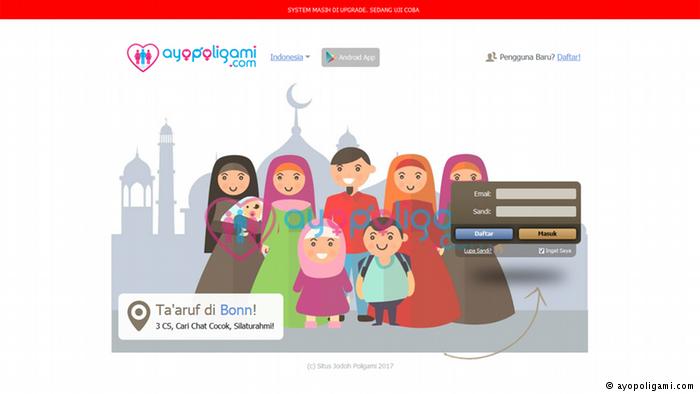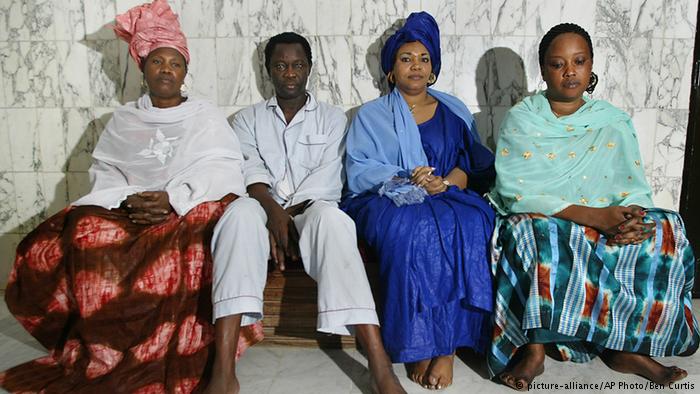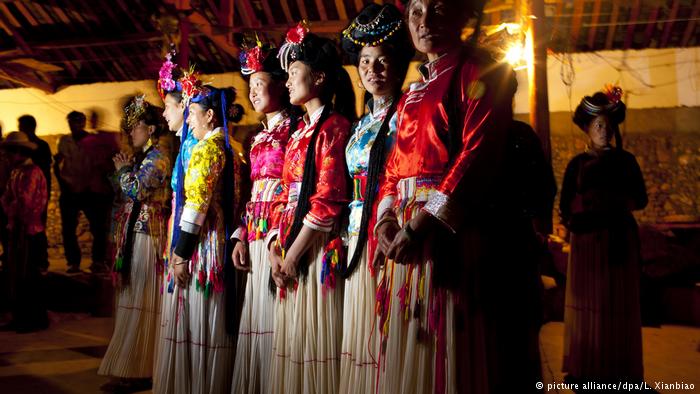‘AyoPoligami’ – Polygamy in Indonesia made easier with new app

A new smartphone app in Indonesia aimed at facilitating male polygamy has drawn condemnation from gender rights activists and triggered a renewed debate about the practice in the world’s most populous Muslim nation.
The notion that a man can take four wives while a woman can marry only one, strikes at the heart of the concept of gender equality, say activists opposing male polygamy, a practice that pits religious and cultural conservatives against liberals and gender rights activists.
The debate elicits sharp and passionate feelings among both proponents and opponents of the custom in which one man has multiple wives. Male polygamy, technically called polygyny, differs from polyandry, where a wife takes multiple husbands.
Polygyny has been practiced for millennia across the world by a wide array of societies and civilizations. In a survey of over a thousand societies conducted by the University of Wisconsin in 1998, it was revealed that only 186 of these were monogamous. The practice was quite common in 588 societies while about 453 had occasional polygyny. Only four practiced polyandry. Some anthropologists are of the view that polygamy has been the norm through human history.
Male polygamy is now outlawed in many places, but not all. It continues to be prevalent in a number of countries, particularly in Africa and the Middle East. The practice remains legal in Muslim-majority nations like Indonesia, Egypt, Malaysia and Morocco as well as in non-Islamic ones like South Africa.

AyoPoligami has proved contentious in Indonesia drawing widespread criticism
In Muslim societies, many use religion as a basis to justify the tradition. The Koran ordains that a Muslim man can marry up to four wives, if he can care for them all equally well. This provision is used to lend religious legitimacy to such marriages, and polygyny is found in almost all Muslim populations, albeit on a very limited scale due to a raft of legal, social and economic obstacles.
Controversial app
This is also the case in Indonesia, the world’s most populous Muslim nation where over 80 percent of the over 250 million inhabitants adhere to Islam and male polygamy is legal. It is hard to gauge the extent to which it is practiced in Indonesia due to the high degree of unregistered marriages there.
Even though polygamy in Indonesia – in contrast to Middle Eastern societies – is not viewed as a taken-for-granted right of Muslim men, observers say, the number of polygamous unions in the Southeast Asian nation is significant.
Indonesian app developer Lindu Pranayama has even spotted a need for a smartphone app to assist married men in finding additional wives. Realizing that there were many married men looking to take more wives and few online services to meet their needs, he developed the smartphone app “AyoPoligami” – roughly meaning “let’s do polygamy” – to “bring together male users with women who are willing to make ‘big families,'” Reuters news agency quoted him as saying.
“We see a current phenomenon where a lot of men are looking to engage in polygamous marriages but when they go to regular dating sites, they don’t see options for polygamy, they don’t see options for finding second, third, or fourth wives,” Pranayama said.
Since its April launch, AyoPoligami, similar to the dating app Tinder, has been downloaded over 10,000 times before it stopped registering new members after concerns emerged that fake accounts were being set up, and that men were using the site without the knowledge of their first wives.
A new version is set to be launched on October 5, and will impose stricter rules on users including requiring them to provide an identification card, marital status and a letter of permission from their first wives.

Ibrahima Sene, a successful businessman, is pictured with his lawfully-wedded first wife Mame Seye, left, second wife Khady, center, and third wife Aida, right, at his house in Dakar, Senegal, Feb. 26, 2004.
‘Normalizing polygamy’
Nevertheless, the app has proved contentious in Indonesia. Critics like Indriyati Suparno, a commissioner on the government-backed National Commission on Violence Against Women, claim it’s trying to “normalize polygamy,” a practice they regard as “a form of violence against women.”
Uly Siregar, an Indonesian writer, says such apps encourage the practice and make it easier for men to enter into polygamous unions, to the detriment of women’s welfare.
The law governing marriages in Indonesia imposes strict regulations on married men seeking to take an additional wife. Religious courts give permission to such unions only if a man’s existing wife is disabled, suffering from incurable illness or unable to bear children. In addition, the man needs to present the consent of his current wife or wives, and has to be financially capable of supporting all his wives and children equally.
But observers question the utility and relevance of the guidelines, pointing out that many men give false information to gain permission from the courts and deny their wives’ right to refuse to consent to additional marriages.
Nong Darol Mahmada, a gender rights activist, underscores that most married men resort to lies when they start mulling over taking a new wife. She says the practice has in reality resulted in poor familial conditions for many wives and children.
“In many cases, domestic violence occurs in polygamous marriage,” said commissioner Suparno.

Mosuo are a small ethnic group living in Yunnan and Sichuan provinces in China. Mosuo women are polyandrous. They take two or more husbands at the same time.
Debate rages on
Opponents of male polygamy vociferously stress that the tradition is completely at odds with modernity. They argue that the institutionalization of men’s right to more than one sexual partner perpetuates gender inequality that favors men’s entitlement within marriage over women’s.
Beyond concerns related to legality and gender rights, there is the issue of reaching an arrangement which is satisfactory to all the parties involved in a polygamous union.
Experts say husbands and wives in polygamous marriages are in constant negotiations over sexual and emotional attachments. The arrangement, they note, doesn’t usually lead to satisfactory relations between husbands and wives or between co-wives, with sexual jealousy toward each other strongly influencing their relationships.
Proponents of male polygamy, though, claim that it is a justified means of satisfying a man’s sex drive, and is a more honest and preferable alternative to having sex outside of marriage and hiding mistresses and illegitimate children.
While some explicitly refer to the Islamic faith to justify their right to take an additional wife, it is difficult to gauge the effect of religiosity on the tendency to engage in polygamy. Scholars underscore the fact that Islam is used to argue both for and against the custom.
In some places, reports suggest that religious leaders and imams influence village men not to take multiple wives and to remain monogamous. Deeply religious men may also be reluctant to marry more than one wife if they feel they cannot meet the requirements and responsibilities laid down in Islamic law for taking additional wives.
The debate surrounding polygamy due to the launch of AyoPoligami comes amid growing conservatism among Indonesian Muslims – a trend that experts say undermines the social progress on women’s rights.
“People are always choosing religion as a reference point in their lives. And if religion is dominated by male scholars with patriarchal tendency, then people will automatically follow their teachings,” said Suparno.
Author: Srinivas Mazumdaru
_____
WTO RECOMMENDS
Nearly all India’s Muslim women reject ‘triple talaq’ and polygamy (I)
More than 90 percent of Muslim women surveyed in India want the “triple talaq” divorce ritual and polygamy banned from family civil law in the country, a study by a women’s rights organization, the Bharatiya Muslim Mahila Andolan (BMMA), showed. (From September 4, 2015)
The fight against ‘instant’ divorce in India
In India, Muslim men can divorce their wives in seconds by uttering the word “Talaq” three times. As a result, women are often left destitute and without access to their children. Now India’s top court is to decide on the legality of the practice. (From May 26, 2017)



